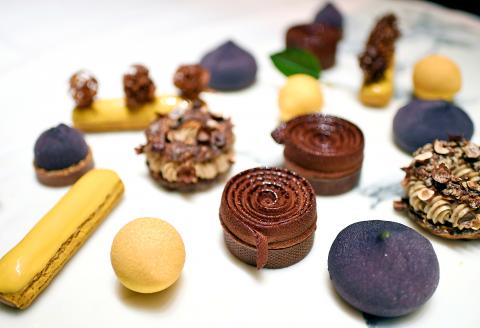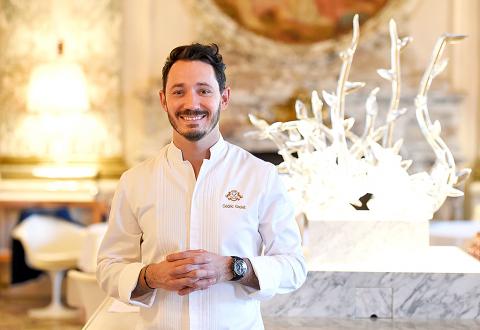When Cedric Grolet takes out his pastry knife, millions of mouths water.
The young Frenchman, named the top patissier on the planet last month by “The World’s 50 Best Restaurants” list, is an Instagram superstar.
Videos of him slicing through the exquisite fake fruit he creates to reveal their tastebud-teasing interiors get millions of views on social media.

Photo: AFP
Millions more drool over images of his glossy hyper-realistic pears, apricots, lemons, peaches and even tomatoes, with Vogue — a magazine not known for its championing of high-calorie desserts — saying they “leave you wanting to lick the screen”.
“His fans cry, fall into his arms and demand autographs” and selfies, said the usually sober French daily Le Monde.
His work is pure “food porn,” it declared, with only a select few getting the chance to consummate their desire every day at the top Paris hotel where he works.

Photo: AFP
With high tea at Le Meurice featuring his cakes sometimes booked weeks in advance, Grolet opened a tiny boutique there in March.
Its shelves empty within hours every day.
His Rubik’s cube cake — which pivots just like the real thing — has become a cult on the fashionable Parisian dinner circuit, although at 170 euros (US$200) for a cake for six, only those with the deep pockets can afford it.
Grolet has even made a blue, white and red version to celebrate France’s World Cup win earlier this month.
Like the members of the French football team, he is something of a working-class hero.
EATING WITH OUR EYES
The son of a hairdresser and truck driver from a small town near Saint-Etienne in central France, his moment of revelation came when he was only 13.
“A farmer gave me a basket of strawberries for helping him pick his crop and I made a strawberry tart with them for my grandfather,” who ran a small hotel nearby, he said. It went down so well that Grolet left school early to apprentice himself to the village baker.
“I would make bread all night so that I would be allowed to make the desserts at 11 in the morning. My reward was to be able to slice the apples and cover the tarts in strawberries.”
He later studied fine patisserie and began winning prizes before leaving to make his name in Paris, aged 20. There he worked for the French gourmet food and delicatessen chain Fauchon, which eventually sent him to Beijing to help train its staff there.
It was also at Fauchon that he worked alongside Christophe Adam in its research laboratory, developing new recipes.
“It was every patissier’s dream,” he said, “trying new things every day.”
Like Adam, who has since founded L’Eclair de Genie, a chain in France and Japan, Grolet has been crowned French patissier of the year and hailed by macaroon guru Pierre Herme as “one of the most talented patissiers of his generation.”
‘NAKED PATISSERIE’
Grolet followed Adam to the exclusive Le Meurice, which is owned by the Sultan of Brunei. He now works there as pastry chef under celebrity cook Alain Ducasse, who urged him to “work even more on taste.”
“Visual beauty attracts the customer, but it is the taste that makes them come back,” said Grolet, who as a millennial himself knows that Generation Y eats with its eyes.
The fact that his creations are not overly sweet has also endeared him to the calorie-conscious beautiful people who queue every day outside his mini-boutique, the first of what Grolet hopes will be a handful across the world.
He began perfecting his extraordinarily delicate fruit six years ago, with their highly worked lifelike skins made from chocolate, with a mousse or marmalade interior made from the real fruit.
“The idea was to do away with the biscuit, the eggs, all the things whose taste doesn’t really do anything and to concentrate on the taste of the fruit,” Grolet said.
It is what he calls “naked patisserie.”
His tarts have a similar hyper-natural edge, with fruit as finely cut as flower petals.
With more than a million followers on Instagram, Grolet is almost as savvy with his smartphone as his with his blowtorch.
“Making cakes is one thing but you have to know how to communicate. You cannot imagine how many photos I take before posting one,” he said. And not being in the country does not stop him creating. He keeps in constant contact with his laboratory at Le Meurice through WhatsApp.
“I draw and work even when I am on the plane, sending back everything that is in my head, and pictures of everything that I loved eating,” said the self-confessed “hyperactive” globetrotter.

Desperate dads meet in car parks to exchange packets; exhausted parents slip it into their kids’ drinks; families wait months for prescriptions buy it “off label.” But is it worth the risk? “The first time I gave him a gummy, I thought, ‘Oh my God, have I killed him?’ He just passed out in front of the TV. That never happens.” Jen remembers giving her son, David, six, melatonin to help him sleep. She got them from a friend, a pediatrician who gave them to her own child. “It was sort of hilarious. She had half a tub of gummies,

June 23 to June 29 After capturing the walled city of Hsinchu on June 22, 1895, the Japanese hoped to quickly push south and seize control of Taiwan’s entire west coast — but their advance was stalled for more than a month. Not only did local Hakka fighters continue to cause them headaches, resistance forces even attempted to retake the city three times. “We had planned to occupy Anping (Tainan) and Takao (Kaohsiung) as soon as possible, but ever since we took Hsinchu, nearby bandits proclaiming to be ‘righteous people’ (義民) have been destroying train tracks and electrical cables, and gathering in villages

The wide-screen spectacle of Formula One gets a gleaming, rip-roaring workout in Joseph Kosinski’s F1, a fine-tuned machine of a movie that, in its most riveting racing scenes, approaches a kind of high-speed splendor. Kosinski, who last endeavored to put moviegoers in the seat of a fighter jet in Top Gun: Maverick, has moved to the open cockpits of Formula One with much the same affection, if not outright need, for speed. A lot of the same team is back. Jerry Bruckheimer produces. Ehren Kruger, a co-writer on Maverick, takes sole credit here. Hans Zimmer, a co-composer previously, supplies the thumping

Swooping low over the banks of a Nile River tributary, an aid flight run by retired American military officers released a stream of food-stuffed sacks over a town emptied by fighting in South Sudan, a country wracked by conflict. Last week’s air drop was the latest in a controversial development — private contracting firms led by former US intelligence officers and military veterans delivering aid to some of the world’s deadliest conflict zones, in operations organized with governments that are combatants in the conflicts. The moves are roiling the global aid community, which warns of a more militarized, politicized and profit-seeking trend